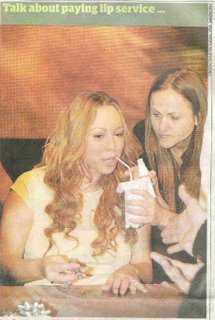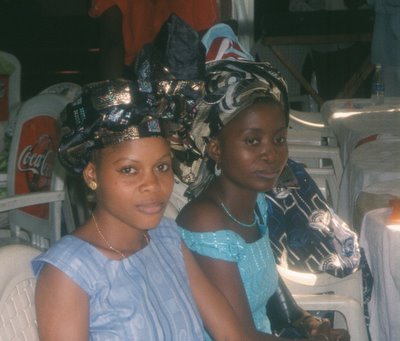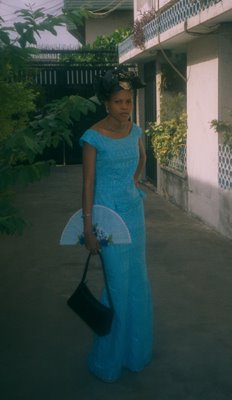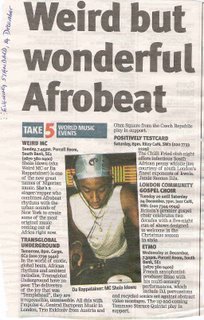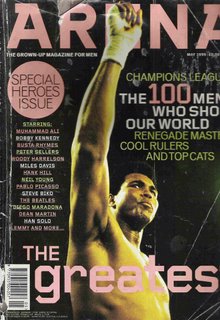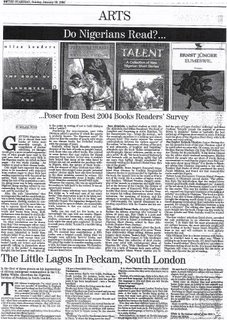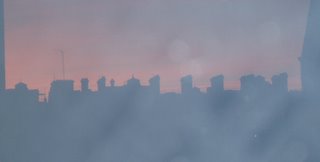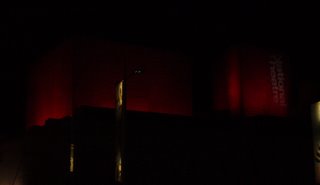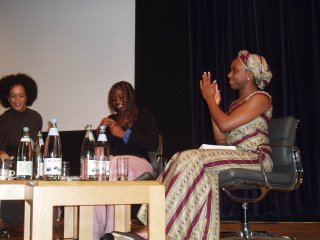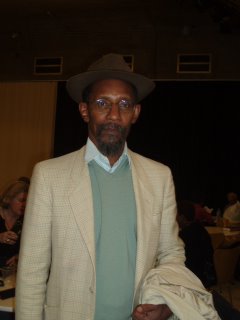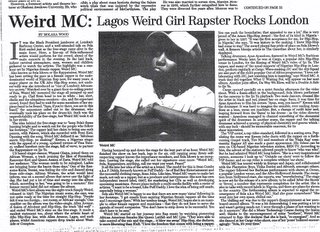 Weird MC - Coming Back at You
Weird MC - Coming Back at You
By Molara Wood
It was the Black President jamboree at London’s Barbican Centre, and a well-attended talk on Fela Kuti ended just as the free-stage came alive in the main foyer. Here, a line-up of Fela-influenced artists would perform for the crowd, ahead of the main concerts in the evening. In the laid back, indoor carnival atmosphere, men, women and children gathered to watch the artistes. The highlight was a one-hour set by Nigerian female rapper, Weird MC.
Also known as Sola Idowu or the Rappatainer, Weird MC has been setting the pace as a female rapper in the male-dominated world of Nigerian Rap now, for many years. A major player on the UK Afro Hip-Hop scene, not undeservedly was she introduced as “one of London’s Afrocentric secrets.” Watched over by a giant floor-to-ceiling poster of Fela, Weird MC mounted the stage all pumped up and ready to go. Clad from head to toe in white - hat, shirt, slacks and the ubiquitous sneakers - she, and the expectant crowd, found they had to wait for some members of her six-piece band to be found. “Sam, if you’re there, you are in this band,” the announcer called out to the drummer, who eventually took his place on the drum-kit. Such was the unpredictability of the free-stage, but Weird MC took it all in her stride.
The idea behind the free-stage was to “keep Fela’s flame burning bright and to watch out for the people who follow his footsteps.” The rapper laid her claim to being one such person, with Palaver, which she recorded with Femi Kuti. Opening with the song, Weird MC defined it as: “Afrobeat meets Hip-Hop, no shaking!” Kween, a Nigerian singer with the appeal of a young, updated version of Tina Turner, walked barefoot onto the stage, full of verve, to partner the Rappatainer on
Ijo Ya.
US based singer-dancer, Wunmi Olaiya, joined them on African Woman, a track praising the likes of Funmilayo Ransome-Kuti and Queen Amina of Zaria. Weird MC told her audience: “The woman needs to be eulogised. Ladies are bringing home the bacon these days.” One of the Ransome-Kutis, Yemisi, was feeling the vibe and danced along from side-stage. African Woman, the artist would later inform, was on a second album that never saw the light of day. She had put a lot of time and energy into the album which, according to her, “was going to be a monster.” Her former record label did not release the album.
Weird MC’s first album was the eight-track
Simply Weird, released in 1997. The Nigerian music scene, she says, was not quite ready at the time for straight Hip-Hop. “People felt it was too foreign… not rootsy, or ‘African’ enough.” One sparkler on the album was the video-single,
Allen Avenue. A fusion of Afrobeat and Hip-Hop, the track “did well” - and ended Weird MC’s stint on the free-stage. It made a modest statement too, about where the artistic heart of Afro Hip-Hop lies; with Allen Avenue, Lagos, and such places, whilst American rappers drop tracks about Westside or Compton.
Having bounced up and down the stage for the best part of an hour, Weird MC finished the show on her back, legs in the air, still rapping away. Every self-respecting rapper knows the importance of monikers, and Sola Idowu is no exception. Leaving the stage, she called out her signatures once more: “Weird MC, Sola, Rappatainer, anything, call me want you want. Peace!”
It all fits into her idea of the artist as a brand. The model for this is Sean Combs a.k.a P. Diddy, formerly known as Puff Daddy - he of Bad Boy Entertainment and the successful clothing range, Sean John. Like him, Weird MC wants to make her mark, not only as a rapper, but as a producer and entrepreneur. She now has own independent record label, 0907, for marketing her CDs as well as developing upcoming musicians. Future plans include a multi-media facility with a roster of artistes. “I want to be a brand, Like Puff Daddy. I love the idea of being self-made, especially being a woman.”
Sola aka Weird MC is happy to see that there are now many ‘sistas’ following in her footsteps. “I get emails from aspiring Nigerian female rappers all the time and I encourage them.” With her tomboy image, Weird MC hopes she is an example to other female rappers and musicians - that they do not have to serve the agenda of record companies. “You don’t have to strip down to be successful. You don’t have to be sexy.”
Weird MC started on her journey into Rap music by watching pioneering African American females like Queen Latifah and MC Lyte. “They were able to take control of the mic and the stage… it blew me away.” Hip-Hop, she declares, is more liberating than R’nB. “I love the freedom that comes with being a rapper. You can push the boundaries; that appealed to me a lot.” She is very proud of the Amen Hip-Hop Award - the first of its kind in Nigeria - given to her in 1997. “It was the first acceptance for me, for Hip-Hop, in Nigeria,” she says. “It was history in the making. I knew Hip-Hop had come to stay.” The award plaque has pride of place on Sola Idowu’s wall. A Benson Idonije article in The Guardian about her, is similarly displayed.
Talking drummer, Ayan Ayandosu, featured in Weird MC’s Barbican performance. Weeks later, he was at Cargo, a popular Afro Hip-Hop venue in London, for the filming of Weird MC’s video of
Ijo Ya. The rapper, and many of ‘the usual suspects’ of Nigerian Hip-Hop in London, perform regularly at Cargo. Wave-making JJC and the 419 Squad are also part of the club’s popular Out of Africa programme. “I love collaborating with JJC, just watching him is inspiring,” says Weird MC. A track they did together,
What U Waiting For, will appear on her next album. Another joint effort,
Da Way We Blow, will be a Double A Side to
Ijo Ya.
Cargo opened specially on a quiet Sunday afternoon for the video shoot. With a flame-effect in the background, Sola Idowu performed for the cameras to the Ijo Ya playback. Two male dancers, dressed like the artist in black and red, joined her on stage. Soon, it was time for Ayan Ayandosu to film his scenes. “Ayan, sexy, you know?” Kween told the drummer. It was hard to imagine the amiable, ever smiling Ayandosu as a lean, mean sex machine. But, a change of outfit later and, leaping forward from the ‘flame’ to his drums - as the video director wanted - Ayandosu managed to channel something of the elemental spirit of the drummer. In another scene, the rapper and the talking drummer achieved a synergy of physical chemistry and genres which - with any luck - should be memorable onscreen, for its sheer innovation.
The ‘VIP scene’, a rap video standard, followed in a seating area. Populating the scene was Kween (who duets with the rapper on a forthcoming Gospel track,
Tire Ni) and members of the ‘Naija Rap’ community. Rapper AY also made a guest appearance. His videos can be seen on UK-based Nigerian television station, BEN TV. According to him, the advent of the station allowed people to know “who was who”. But he had admired Weird MC long before. “She is a very inspirational person, someone I look up to.” ‘Outside car shots’ were to follow the VIP Scene; and no rap video is complete without ‘car shots’.
Weird MC has toured widely in Europe and Japan, and collaborated with the Plantashun Boys, Yinka Davies and Afrocelt, amongst others. The rapper followed her Barbican performance with shows at Ocean, a popular London venue, and the Afro-Hollywood Awards. The reception from Nollywood stars, she reports, was “overwhelming.” The stage is now set for the release of a new album; to be called ‘
After the Storm’ or ‘
Seven’, a number that represents completion for the artist. She is also in talks with record labels in Nigeria, and there are plans for shows in the country. The forthcoming album is expected to signal the re-emergence of Sola a.k.a Weird MC. Had she gone somewhere? “She went into her own space, chilled out.”
The ‘chilling out’ was due to the rapper’s disappointment at her unreleased second album. “It was a bit demoralising. I was putting a lot in and wasn’t getting much out. I went through a phase of not wanting to do it anymore.” She did a Music Technology Course during the hiatus and; thanks to the encouragement of some “brothers”, Weird MC returned to Rap. She declares that she is back, “re-energised”. And as she danced at her Cargo video shoot, one of her ‘posse’ hollered encouragingly: “Sola, it’s your time.”
4 Audio samples of Weird MC’s Double A Side single,
Ijo Ya /
Da Way We Blow, will soon be available on her
website.
This article was published in The Guardian, Lagos, Nigeria, on 13 February, 2005.
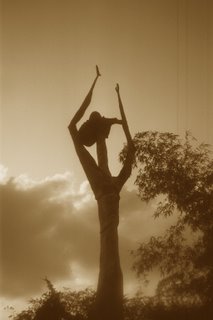
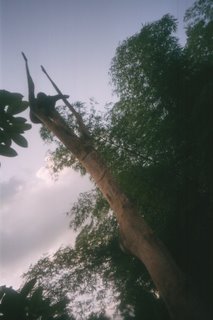 Jesus might have favoured a
Jesus might have favoured a